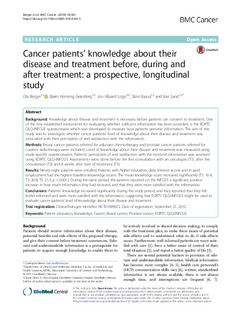| dc.contributor.author | Berger, Ola | |
| dc.contributor.author | Grønberg, Bjørn Henning | |
| dc.contributor.author | Loge, Jon Håvard | |
| dc.contributor.author | Kaasa, Stein | |
| dc.contributor.author | Sand, Kari | |
| dc.date.accessioned | 2019-02-21T08:13:39Z | |
| dc.date.available | 2019-02-21T08:13:39Z | |
| dc.date.created | 2018-06-18T14:33:45Z | |
| dc.date.issued | 2018 | |
| dc.identifier.citation | BMC Cancer. 2018, 18:381 1-11. | nb_NO |
| dc.identifier.issn | 1471-2407 | |
| dc.identifier.uri | http://hdl.handle.net/11250/2586629 | |
| dc.description.abstract | Background
Knowledge about disease and treatment is necessary before patients can consent to treatment. One of the few established instruments for evaluating whether sufficient information has been provided, is the EORTC QLQ-INFO25 questionnaire which was developed to measure how patients perceive information. The aim of this study was to investigate whether cancer patients’ level of knowledge about their disease and treatment was associated with their perception of and satisfaction with the information.
Methods
Breast cancer patients referred for adjuvant chemotherapy and prostate cancer patients referred for curative radiotherapy were included. Level of knowledge about their disease and treatment was measured using study-specific questionnaires. Patients’ perception of and satisfaction with the received information was assessed using EORTC QLQ-INFO25. Assessments were done before the first consultation with an oncologist (T1), after the consultation (T2) and 8 weeks after start of treatment (T3).
Results
Ninety eight patients were enrolled. Patients with higher education, daily Internet access and in paid employment had the highest baseline knowledge scores. The mean knowledge score increased significantly (T1: 16.4; T2: 20.8; T3: 21.3; p < 0.001.). During the same period, the patients reported on the INFO25 a significant, positive increase in how much information they had received, and that they were more satisfied with the information.
Conclusions
Patients’ knowledge increased significantly during the study period, and they reported that they felt better informed and were more satisfied with the information, suggesting that EORTC QLQ-INFO25 might be used to evaluate cancer patients’ level of knowledge about their disease and treatment. | nb_NO |
| dc.language.iso | eng | nb_NO |
| dc.publisher | BMC (part of Springer Nature) | nb_NO |
| dc.rights | Navngivelse 4.0 Internasjonal | * |
| dc.rights.uri | http://creativecommons.org/licenses/by/4.0/deed.no | * |
| dc.title | Cancer patients' knowledge about their disease and treatment before, during and after treatment: a prospective, longitudinal study | nb_NO |
| dc.title.alternative | Cancer patients' knowledge about their disease and treatment before, during and after treatment: a prospective, longitudinal study | nb_NO |
| dc.type | Journal article | nb_NO |
| dc.type | Peer reviewed | nb_NO |
| dc.description.version | publishedVersion | nb_NO |
| dc.source.pagenumber | 1-11 | nb_NO |
| dc.source.volume | 18:381 | nb_NO |
| dc.source.journal | BMC Cancer | nb_NO |
| dc.identifier.doi | 10.1186/s12885-018-4164-5 | |
| dc.identifier.cristin | 1591963 | |
| dc.description.localcode | © The Author(s). 2018 Open Access This article is distributed under the terms of the Creative Commons Attribution 4.0 International License (http://creativecommons.org/licenses/by/4.0/) | nb_NO |
| cristin.unitcode | 194,65,15,0 | |
| cristin.unitname | Institutt for klinisk og molekylær medisin | |
| cristin.ispublished | true | |
| cristin.fulltext | original | |
| cristin.qualitycode | 1 | |

